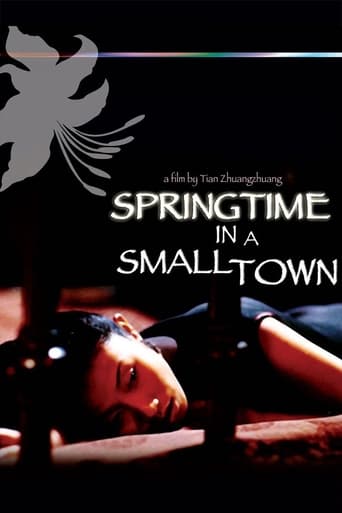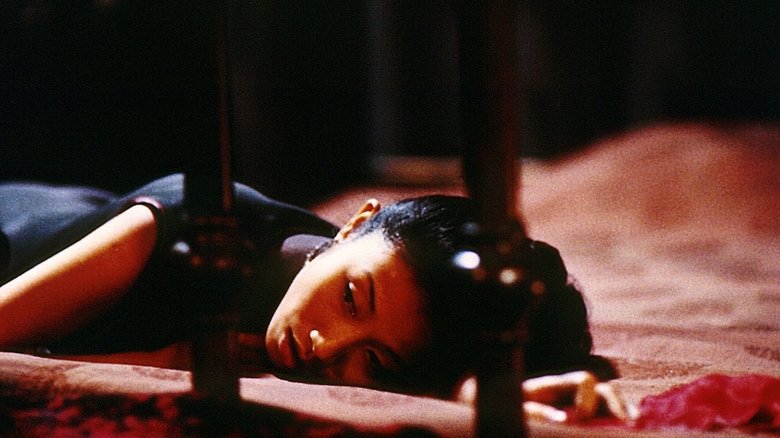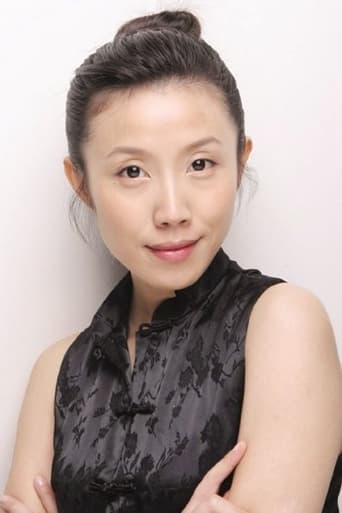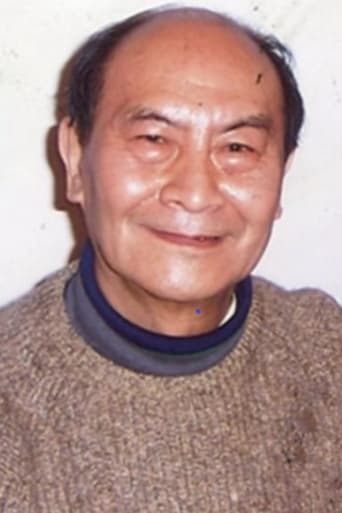

Springtime in a Small Town (2002)
In a mansion decimated during World War II, a frustrated, bored housewife, Yuwen, is torn between caring for her ailing husband and her longing for a former sweetheart, a doctor who has come to treat her husband.
Watch Trailer
Cast
Reviews
Very best movie i ever watch
Better Late Then Never
This is a small, humorous movie in some ways, but it has a huge heart. What a nice experience.
There's no way I can possibly love it entirely but I just think its ridiculously bad, but enjoyable at the same time.
Set in the days immediately following World War II, the Chinese film "Springtime in a Small Town" is a poetic, slow-moving meditation on the part that love, passion, compromise, self-sacrifice and renewal play in our lives and our relationships.Liyan and Yuwen are a young married couple living in the crumbling ancestral home of the man's deceased parents. Struggling under the burden of an arranged marriage, Liyan and Yuwen have been drifting farther and farther apart over time - he obsessing over his chronic health problems (possibly psychosomatic in nature) and she secretly yearning for a more fulfilling life away from this man who seems not to care for her. Then one day, Zhang, an old boyhood pal of Liyan's, comes to pay a visit. Now a doctor, Zhang is shocked to discover that Liyan's wife is Yuwen, the very woman whom he loved but left ten years earlier. Tensions very quickly develop in the household as Zhang and Yuwen begin to take steps towards rekindling their romance - forcing each of the three individuals to come to terms with long unresolved desires and emotions.In its quiet, subtle way, "Springtime in a Small Town" explores what happens when human emotions and passions are repressed under the weight of societal restrictions and cultural traditions. Writer Cheng Ah and director Zhuangzhuang Tian unfold their story slowly, never feeling the need to rev up the action or overemphasize a detail to make a point. The film establishes a hypnotic rhythm and a tone of quiet contemplation from the outset, allowing us to soak in all that is happening on the screen at our own leisure. For despite the fact that there may not SEEM to be a lot happening in the film, there is actually a wealth of human drama taking place right beneath the placid surface of the tale. These are characters whose every word, every gesture reveals some aspect of the universal human condition. To heighten the intimacy of the piece, Ah and Tian have circumscribed their canvas so that only five people even make an appearance in the film (Liyan's teenaged sister and an aged family servant are the movie's other two characters). "Canvas" is indeed the operative word here, for Tian has treated this film much like he would a painting, capturing his characters in stark tableau often set against strikingly beautiful natural landscapes. The camera glides along at an unhurried pace, helping to draw us into this strangely beautiful world where seething human passions play themselves out in settings. The filmmakers also deserve credit for providing a remarkably ambiguous ending. We really aren't quite sure how we are supposed to react at the end of the movie and that is as it should be when it comes to art.The lovely Jingfan Hu is both heartbreaking and not a little frightening as the normally composed young woman who may not be quite as sweet and submissive as she appears to be on the surface. The shots of her strolling through the countryside in all her placid, regal beauty are haunting and memorable in their exquisiteness. Jun Wu as Liyan and Bai Qing Xin as Zhang also give excellent performances, never allowing their strong feelings to rise much above the level of a whisper. Liyan is a particularly fascinating character in that we get the sense that he may be using his "illness" as a means of avoiding the responsibilities and pressures of being a true husband to his wife. The power struggle that develops among the three of them is devastating in its understatement and subtlety.There's no denying that "Springtime in a Small Town" demands a certain amount of patience from the viewer. But anyone who opens himself up to the beauty of its images and the truth of its observations will find it to be a profoundly rewarding experience well worth the time and patience.
May be if all films were like Springtime in a Small Town, life would be a tad boring. As it is, the film is a fresh breeze in a stale room, which is also an apt metaphor for the story of a childhood friend and old flame reappearing in a small town, disrupting a dull, lifeless marriage.This film is understated to the point of being minimalist. It is set in the aftermath of the Second World War, in a small town that has been systematically bombed and now mostly in ruins. In a run down old house lives a husband with a mysterious ailment; his young sister; a wife unsure of what she is looking for in life, certain only that she hasn't found it yet, and an old manservant. Into this mix comes a doctor from the big city, visiting his old friend. Upon arriving he is surprised to discover him married to his childhood sweetheart, the luminescent Yewen (Jing Fan Hu).So, we have the classic love triangle: except may be not. The tensions which develop between the three main leads are delightfully understated, but culminate in several set pieces of pure drama. Best of all, plot resolution is achieved without the director/scriptwriter feeling the need to tie up all of the emotional loose ends as well. Some may find this leaves an empty feeling. Me, I thought that's life.If you need another reason to watch this film (apart from the gentle, delicate story and the lovely acting) there is also the gorgeous cinematography of Ping-Bin Lee. This is not of the I-suspect-soon-to-be-ubiquitous overripe Christopher Doyle school, but an altogether more subtle and engaging beauty (though, interestingly, they worked together to create the Hong Kong classic, In the Mood for Love). Lee seems to be able to find beauty and mood in broken buildings, barren spaces and muted colours. It is a tragedy that the MTV generation pushed this film into the repertory theatres, as I would have loved to have seen it on a really big screen.I suppose people fed and watered on I Robot and Saving Private Ryan might well yawn all the way through Springtime in a Small Town, but I think it was easily the best film (that I saw) in 2002. Well worth its 9/10 rating.
[See IMDb main page for this film for cast names-none are known outside China]"Springtime in a Small Town" is director Zhuangzhuang Tian's re-make of the 1948 film of the same name, an intense and rare example of Chinese film-making from that turbulent time which few have seen.The time is after the Japanese surrendered and before Mao drove Chiang to Formosa. In what was once a munificent villa, saved from utter destruction after a Japanese air raid by a fortuitous cloudburst, the Young Master, Liyan, lives with his wife, Yuwen and his sister, Dai Xiu, a perky teenager on the cusp of womanhood. They are served by a faithful family retainer, Huang.Liyan appears ill with a persistent hacking cough and he alternately consumes and refuses herbal medicines. Into this domestic scene arrives, after a ten-year absence, young doctor Zchichen, a boyhood friend of Liyan and, as it turns out, a fellow who knew Yuwen before her arranged marriage. Quick examination by the novice M.D. reveals what most viewers would have already suspected: Liyan is a pitiful hypochondriac whose self-absorption drove his pretty wife into a separate bedroom long ago.What follows is the growing mutual attraction of Zhichen who harbors long held deep feelings for Yuwen and the woman's awakening awareness that her marriage is a sham: she knows she made a mistake by not leaving with Zhichen a decade earlier.This is a story told largely through dialogue between the three protagonists. A few scenes have them gamboling outside the compound but only one, with a number of teenagers, is actually in the nearly burnt out village. An amusing rowboat outing has the group singing in Chinese to the tune of "The Blue Danube."This being a Chinese romance of sorts, moral values and not simply fear of the censor restrain Yuwen and Zhichen's gnawing passion for each other. They suffer all the pain of deep guilt with none of the offsetting pleasures of carnal consummation.The story, by itself, is neither unique nor totally absorbing. I felt like yelling out to Liyan, "Hey fellow, stop this pretense of being very sick and get your house in order before you no longer have one." But I behaved.There is a political coda to "Springtime in a Small Town" that very many Chinese won't miss and neither will foreign viewers acquainted with modern history. For a start, at the beginning of the film a title-board expresses Tian's regard for the Chinese film-makers of 1948 who produced the original version. That establishes a link with a past that has a a gaping interruption, an important albeit quiet statement by this fine director.In all cultures with sharply varied seasons, spring is always seen as a time of renewal for both man and nature. That point is elegantly portrayed in the current, beautiful Korean film, "Spring, Summer, Autumn, Winter...and Spring." Movies, literature and even classical music celebrate spring as a time of hope and regeneration (and it's not for nothing that the hit song in the musical and movie, "The Producers," is "Springtime for Hitler :) ).As "Springtime in a Small Town" ends Liyan and Yuwen tend a garden emerging from winter. However hopeful their outlook, any knowledgeable viewer knows that they will shortly face public accusation, humiliation, self-abnegation, loss of property and - not unlikely - death by a People's firing squad as bourgeois landowners. Their spring will be followed by a deadly political winter and Tian subtly reminds the audience that the next chapter in China's postwar history is one of repression and pain.A common enough love triangle before a deep and depressing chapter of a great people's imminent descent into chaos and even mass madness. This film is a healthy indication that China's film industry is slowly recovering.8/10
I usually don't dig Chinese movies. As far as asian cinema is concerned, I am more a Japanese or Korean fan. But this Springtime is bliss. Just about everything is beautiful, from script to cinematography to acting (with the notable exception of the girl who plays the young sister, whom I thought was over-acting).One thing I thought was interesting is the way director Tian expressed his intention of editing from the original version of the movie (shot in the '50s) all the elements that would not appeal to a viewer today. Therefore, we must assume that pre-arranged weddings are still a common fact in today's China. What about love ?Well, enough for the pseudo-sociological analysis. On a more pleasure-oriented level, this is a jewel. Not a perfect movie, granted, I couldn't rate it more than the 8 I gave it, but such a nice little piece of work. Colors, sounds, camera movements, actor's play, everything is fluid, warm, inhabited. A very nice springtime in a small town indeed...


